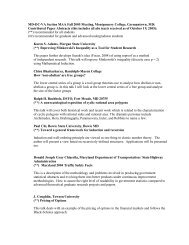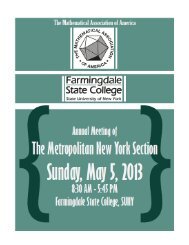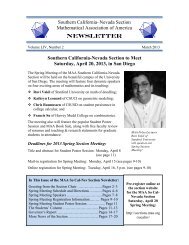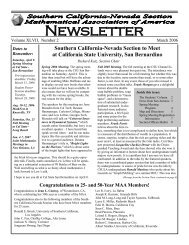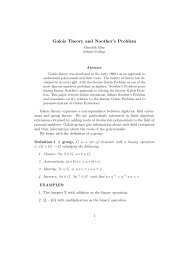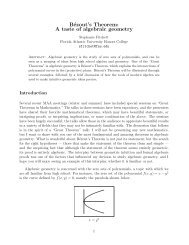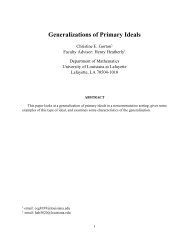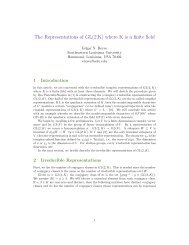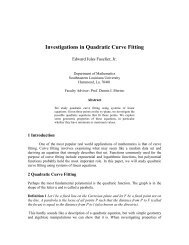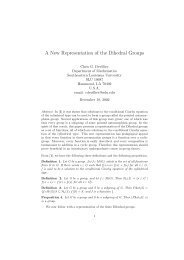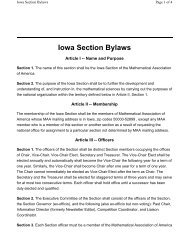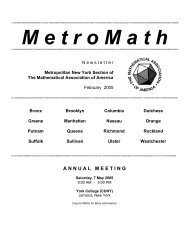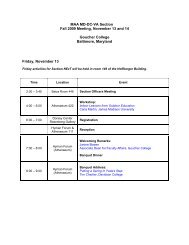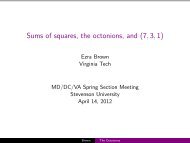Program - MAA Sections - Mathematical Association of America
Program - MAA Sections - Mathematical Association of America
Program - MAA Sections - Mathematical Association of America
Create successful ePaper yourself
Turn your PDF publications into a flip-book with our unique Google optimized e-Paper software.
equations is followed by two examples <strong>of</strong> systems with fractional-order characteristics, a long<br />
electrical line and a viscoelastic damper.<br />
Compatible Pairs: Some Interesting Results <strong>of</strong> Pythagorean Triples<br />
Ryan R Shearer<br />
Student, Ashland Univ<br />
Abstract Number: 50. If we evaluate the roots <strong>of</strong> a given quadratic equation, ax 2 – bx + c, and our<br />
results are integral values, then a compatible quadratic equation, ax 2 – bx - c, will also have integral<br />
roots. While investigating compatible pairs we find several interesting relationships involving<br />
Pythagorean Triples which will be examined. Through the examination <strong>of</strong> Pythagorean Triples we<br />
will be able to give a better understanding to when and how a quadratic equation is compatible.<br />
Winning Percentages Can Be Misleading<br />
Laurence D Robinson<br />
Faculty, Ohio Northern Univ<br />
Abstract Number: 51. In most sports situations, the “winning percentage” for a team (or<br />
conference, or league, or franchise) is an appropriate measure <strong>of</strong> accomplishment. However, there<br />
are situations where winning percentages can be misleading. In this talk we discuss two such<br />
situations, involving the NCAA Men's Basketball Tournament and the Super Bowl.<br />
Some More Teaching Tips<br />
Thomas Hern<br />
Faculty, Bowling Green St Univ<br />
Abstract Number: 52. I will present some tips that I didn't have time for in my talk at the last<br />
Section meeting.<br />
Is 99,999,989 prime? Determining primality <strong>of</strong> 'small' numbers.<br />
John P Stonestreet<br />
Student, Marshall Univ<br />
Abstract Number: 53. We know that 99,999,999 is not prime: the sum <strong>of</strong> the digits is 72, which is<br />
divisible by 9. Useful trick. What about 99,999,989? It’s not even, and it’s not divisible by 3 either.<br />
Would you divide by every integer less than 99,999,989? Why not just try the odds, or better yet<br />
only try the primes? And when can you stop? One <strong>of</strong> the more efficient methods for determining<br />
primality <strong>of</strong> “small” numbers (less than 1 billion) uses the Sieve <strong>of</strong> Eratosthenes, developed back in<br />
240 BC. Come learn what this ancient genius said, and see its modern implementation using<br />
computer power!<br />
Saturday 11:40 – 11:55<br />
Spelling Me<br />
Ryan Frase<br />
Student, Ashland University<br />
Abstract Number: 54. The Price Is Right is a popular game show that awards various prizes to<br />
contestants who correctly guess in pricing games. Some <strong>of</strong> these games are purely chance while<br />
others can use probability to develop a strategy. Spelling Bee is one <strong>of</strong> these games that uses<br />
probability, but I gave the game a little twist and came up with my version <strong>of</strong> the game, Spelling Me.



